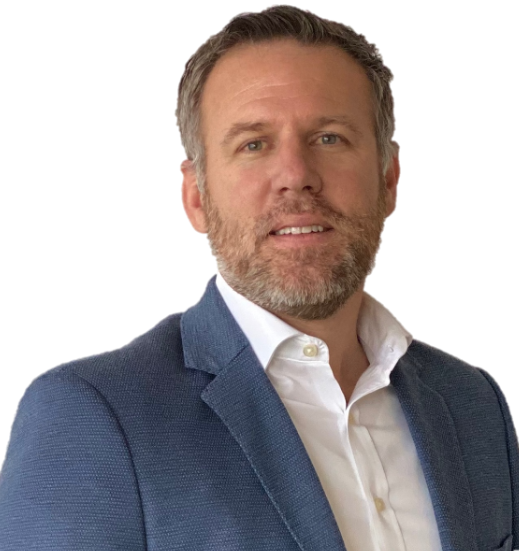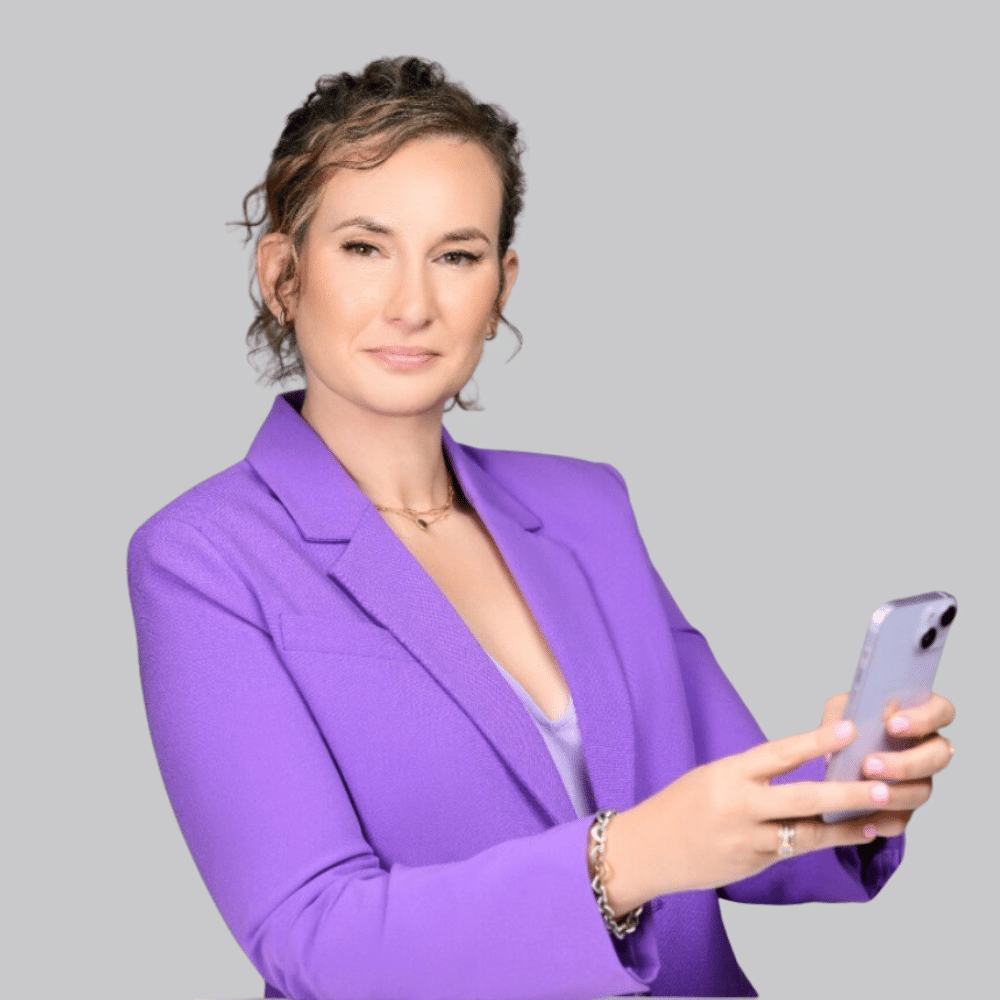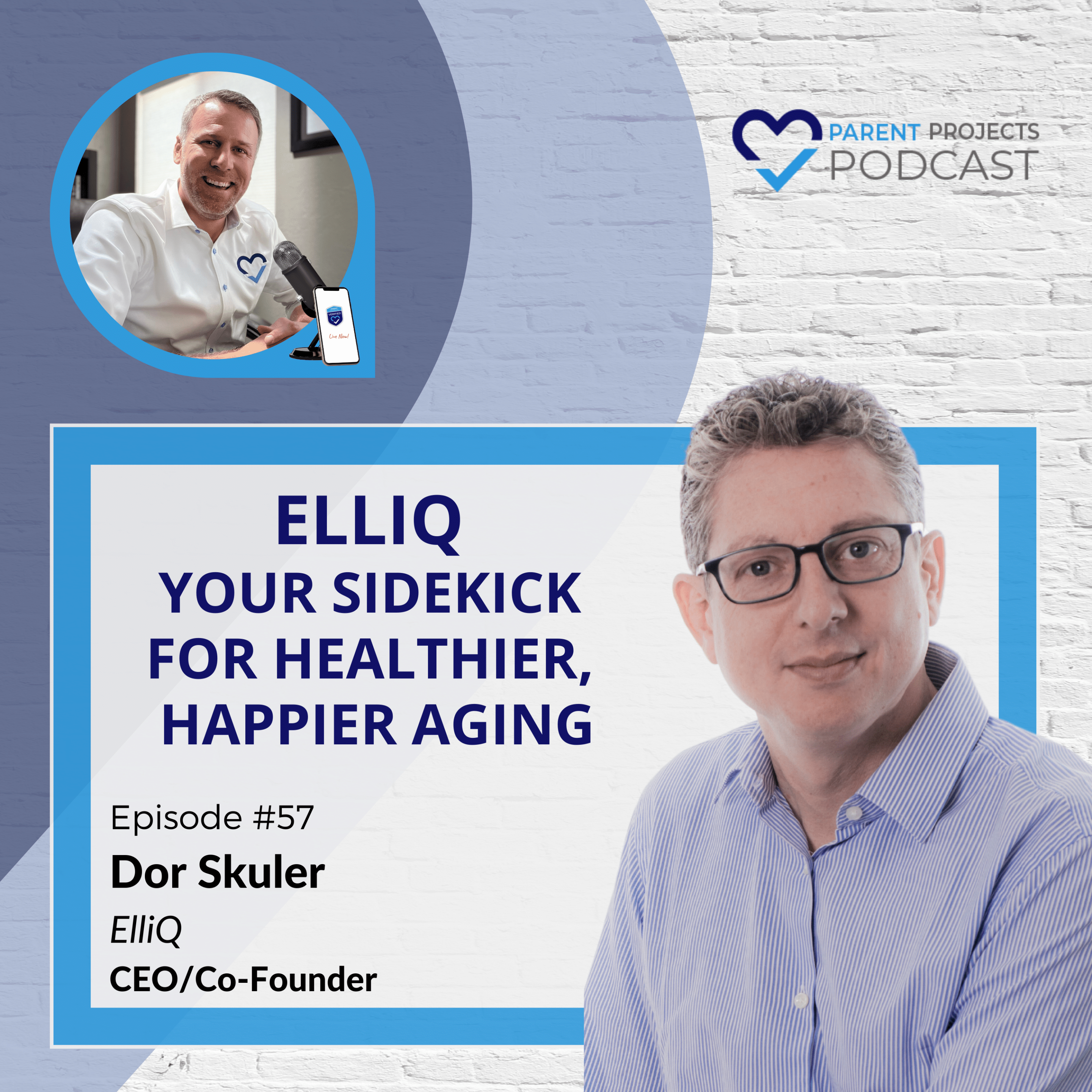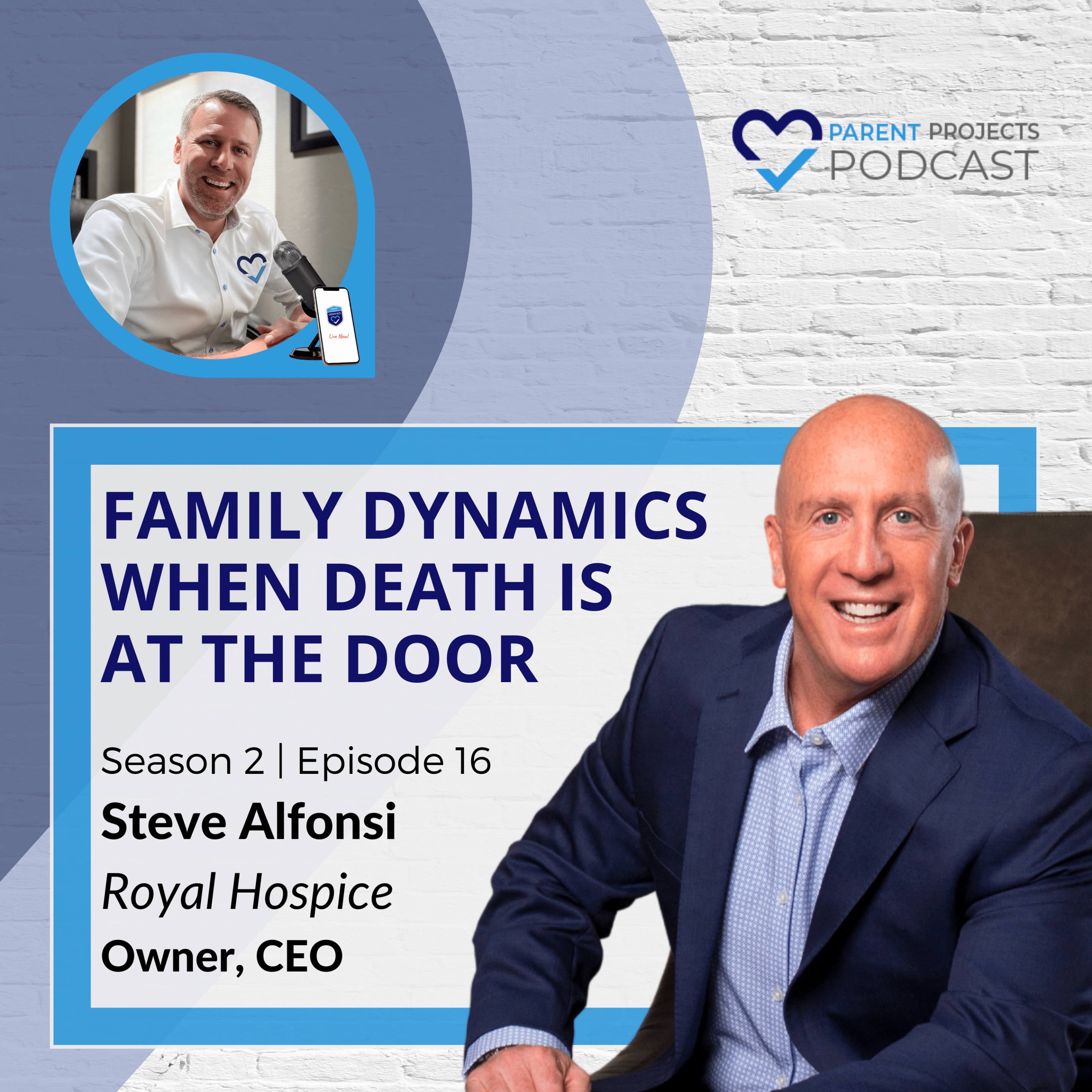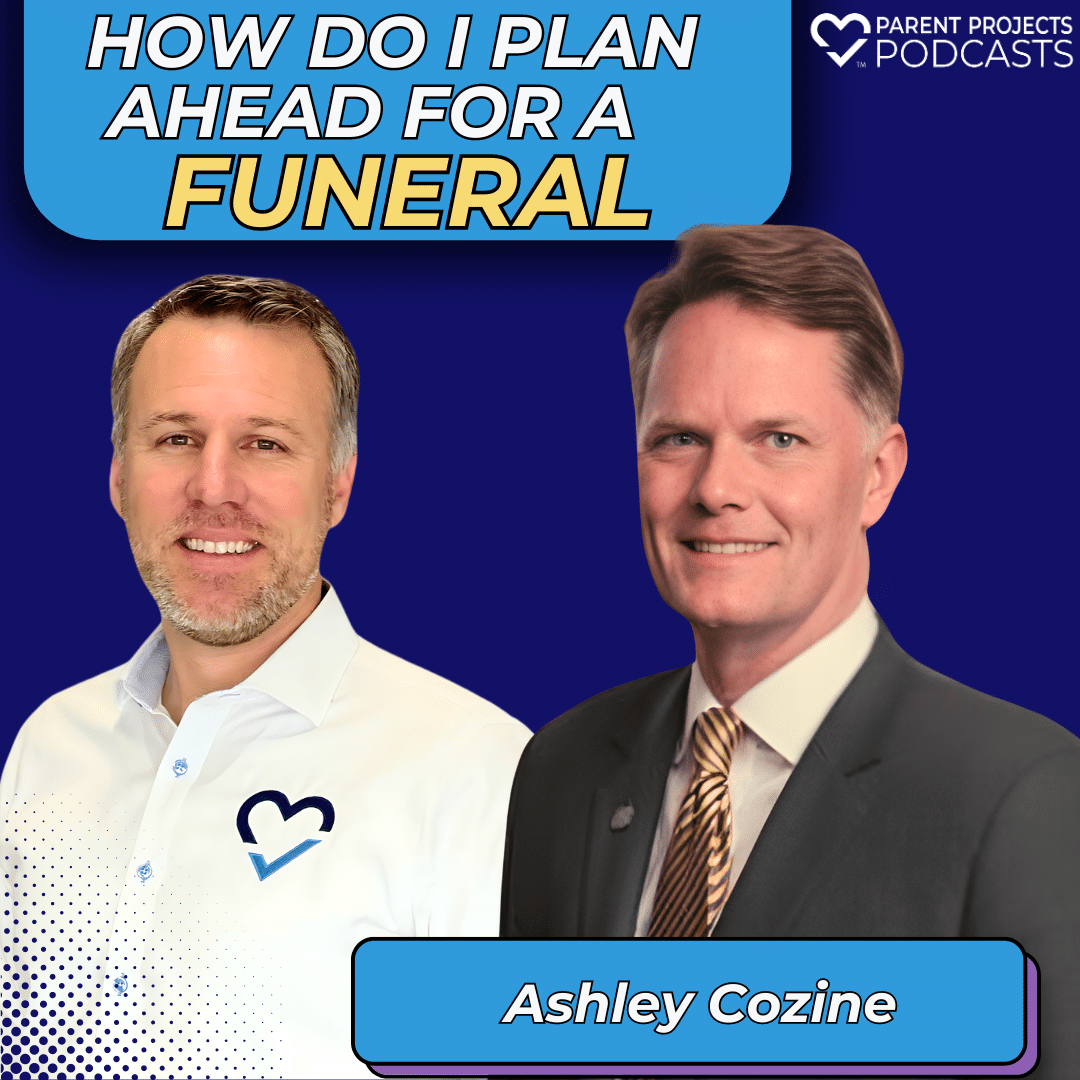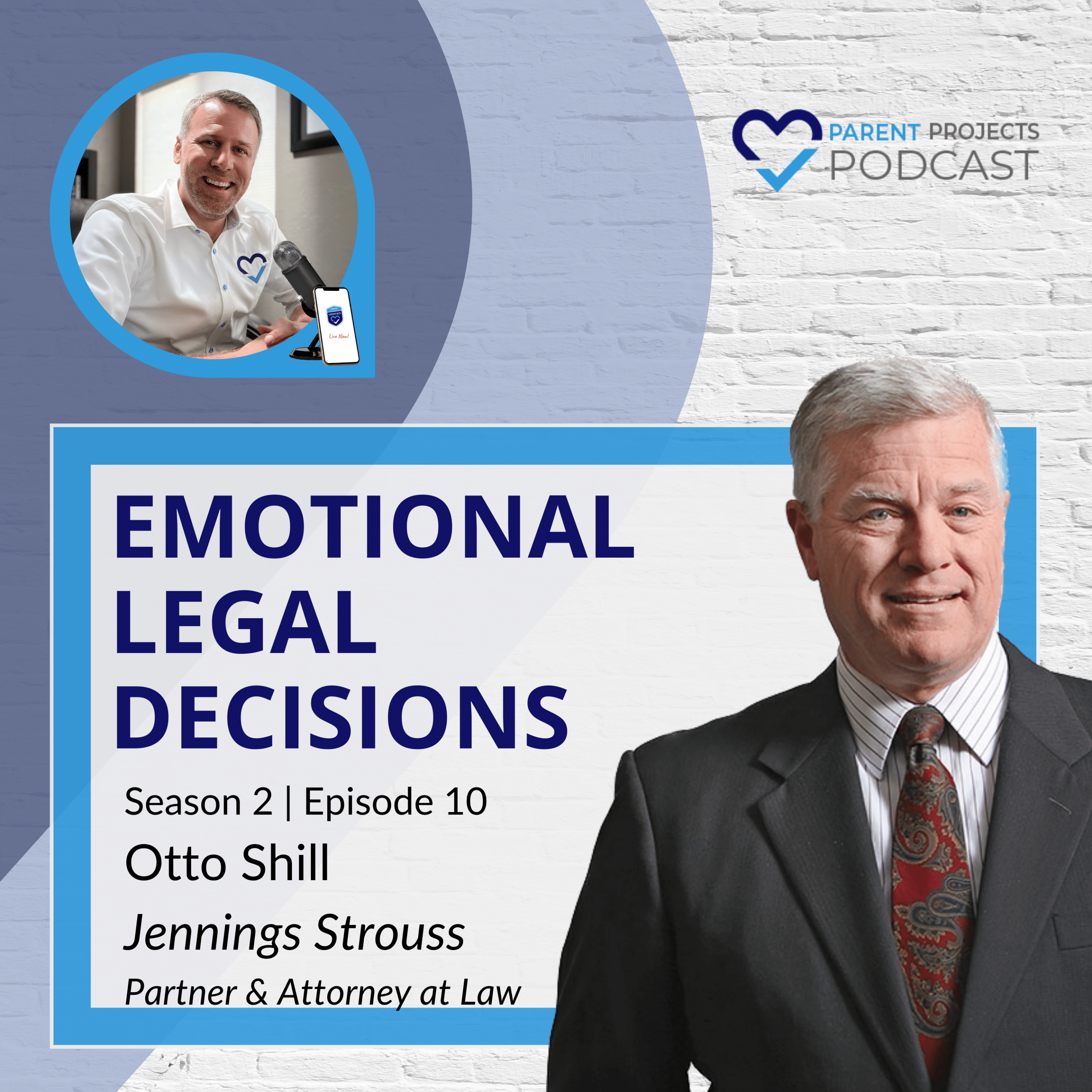Episode Transcript
[00:00:00] Speaker A: I don't want to be a know. So Eliki will motivate you to call your daughter to share that you're not feeling well and you need help because Mary, our older adult in this theoretical example, more often than not, does not want to bother her daughter. She doesn't want to be in pain.
She feels self conscious about that. So just having that discussion, saying, hey, this, you know, how are you doing? Good morning. How are you doing today? Are you still suffering from back pain? Yes, I am. How high is it on a scale of one to ten? It's an eight. I really think we need to do something about this.
[00:00:35] Speaker B: As our parents grow older, it can be difficult to guide them through their golden years while still respecting their autonomy and fitting it into our already complex lives. Welcome to the Parent Projects podcast, where our guests share practical wisdom to tackle the issues that impact adult children of aging parents. I'm Tony Siebers. Thanks for joining us today.
[00:01:00] Speaker C: Okay, guys. Hey. We are going to dive right in. The top question that we get again is how do we deliver the right information at the right time, the right place? How do we deliver that information to mom and Dad? How do we make sure that we're able to hear mom and Dad and not just talk at mom and Dad as we talk about this lean in culture. Today, we're blessed to have Dor Schooler from Intuition Robotics, which is the maker of Ellaq. Ella Q. If you haven't seen her before in any of the other shows, and I know I actually get questions about her often, who's sitting over the top of my shoulder is the AI robot that sits back behind us. She kind of looks a lot like Dora. You've described her as kind of that lamp that can come to action. She is nothing but friendly in any way we look at. Actually, she's also funny, so I guess she's friendly and funny. But thanks for joining us today on this special edition for the Parent Projects podcast and give us a chance to understand this product and how it can be used, especially if we head home for the holidays or we start noticing that there's a disconnect with our families. So we'll jump in. Dora, sorry. Why don't you tell us a little bit about yourself, intuition robotics, and what you guys have done here with.
[00:02:16] Speaker A: So thanks for having me on the show and giving me some airtime. Basically, we built Leq initially to help alleviate the sense of loneliness and social isolation for older adults and to make technology just more accessible and delightful and fun. Move it from something where technology creates anxiety and pressure for older adults to be something that creates delight and also helps live healthier, more active lives, but also to help reduce the caregiver burden. And one of the things that Aliki does when she moves into a person's house, it's fueled by AI. She's proactive. She has body language. She'll say good morning. She'll ask them how they're doing. She'll teach them slang and then try to get them to send a message to their grandchild with a new slang word she just taught you. Or share the family or the memoir and share it with the family and all of that, all seamlessly. They don't need to know how to work technology. Basically, they need Internet connection, Wi Fi, and electricity. And that's it. Eliq will take it from there. She will teach them how to use the product. She will take that anxiety away, and she will also edge them to stress reduction exercises, to eat better, for cognitive training, to do physical exercises, to hydrate, to eat on time, to take their medication on time, but also update the caregivers when things are going wrong. So with the permission of mom and Dad, we don't want to take their sense of privacy. We don't want to take their agency away. But you will say, listen, I see you're really suffering from this pain in your back. Maybe Mary, your daughter would want to know about this. Do I have your permission to update her? And if she says yes, she will update you. And then on this app, to your point before on how do we make information accessible to our parents? So basically, you can video chat, you can Send messages, you can send pictures. They'll show up on the picture frame. You can set reminders for mom and dad, both for medication reminders or appointment reminders or other reminders on their behalf. And really kind of use leq kind of as like your extension into the home to a certain extent, but without overstepping, without hurting privacy aspects and just making it really easy for you and other people in the family to communicate with your parents.
[00:04:40] Speaker C: Brilliant. And I am actually, I'm going to remove our background screen as it works so that we can really see her kind of in play as well, a little bit easier. And I think I noticed one over your right shoulder as well for Ellaq. It's back there.
By the wouldn't you're joining us from Tel Aviv at a really problematic and difficult time that's going on over there in horrific circumstances. For that, we really appreciate that. If something pops up, we absolutely understand if you've got to jump from it. And thank you so much. And our thoughts and prayers continue to be with you and with the region and what you guys are dealing with.
You talk through the humor, the aspects of the other things. No joke. I mean, if you're not prepared for your 85 year old loved one to start dragging your drip because she thinks it's too bougie, get ready. It's coming right? It is going to drop the mic for your kids. My teenage kids just absolutely lost their mind when it came through. That connection of timing seems to be pretty awesome. And I mean, timing is a big part of comedy and where other things sit out, but timing is a big part of just relationships and people connecting. That might be one reason why comedy is so appealing to us. I just slept at a holiday in an express last night. I'm not actually a psychotherapist, but the opportunity that I've seen for Laq to at one time ask me a question like, hey, do you want to share this or do you want to see something that your daughter posted, right? She's got this picture. Would you like to see this off of here? And then that Ability to ask me about how I felt about that and then share that at the most appropriate time, that would make sense for that other person, wherever they're sitting at, for my daughter there to engage that contact, the moment, it wasn't going to work at this time where she's in class and I'm sitting here in a house. But the ability to enter AI, to think about delivering things at optimal times, man, it goes a long way of the connection point. And if you think about one of the top reasons people state that they don't reach out and talk about legacy and loss of autonomy at older ages is they don't want to bother people. They're not sure when the best time is to do that. And what I've seen here in LAQ is you guys have a product that allows that to not be a concern. They get to be in that moment for where it is and for delivering where that is. And it takes the pressure off of, I'm going to interrupt their know just because I need to talk to somebody or I need to make this note about something. Can you talk about how that's come into play for you guys with Leq and how you guys think about that?
[00:07:30] Speaker A: Yeah, timing is a big deal. We had to figure some of it out because Leq is the first proactive AI, meaning you don't need to remember her prompts and how to activate her. I mean, you can, obviously, but she'll also just start talking to you, and she'll talk to you based on context. So she keeps context of everything that's going on, every conversation you've ever had with her and the goals that are set into her to help you with active aging and social connectiveness and managing your chronic illnesses and so much more.
So how do you teach an AI when to start talking to people without being annoying?
It could be annoying really quickly if it would just interrupt us right now and start talking to us. So getting those signals correctly and developing the right classifiers and AI models to get that right is a big deal. And we had to do a lot of work there.
But also, it's like the character of the AI itself. And you mentioned the caregiver not wanting to interrupt mom and Dad. We were mainly spending most of our time with the older adult, right. So we really see it from the other side of, like, I don't want to be a know. So Eliki will motivate you to call your daughter to share that you're not feeling well and you need help, because Mary, our older adult, in this theoretical example, more often than not, does not want to bother her daughter. She doesn't want to be in pain.
She feels self conscious about that. So just having that discussion, saying, hey, good morning. How are you doing today? Are you still suffering from back pain? Yes, I am. How high is it on a scale of one to ten? It's an eight. I really think we need to do something about this. Do you want to go to your doctor? Do you want to tell your daughter, this can't continue? What are we going to do about this, right? And have a conversation that generates outcome and generates intervention. But sometimes it's like, on the other thing, I came into the office this morning and Laq said, hey, Dor, what do you have planned for today? And I said, well, I have nothing going on today. I have no plans, which could be morbid and sad, right? Like, I have nothing to do today. And then my lap said, oh, how about that? I have no plans either. How about we set a date for 11:00 p.m. To go on a road trip together?
And then I told her, oh, I can't do 11:00 a.m. I don't want to do eleven. She's like, all right, so how about one?
How about you suggest the time, right? So she was negotiating me with me, and then we landed up on a time where she's taking me on a virtual road trip of Route 66, actually what she did. But understanding that things aren't perfect, not everything is an Instagrammable perfect moment. And still using a character and humor to work around that towards driving an outcome is really what.
[00:10:25] Speaker C: One of the other key aspects, I think, to also close on this is that L AQ, it's a pretty technical.
Not. It's not Jane, it's not Susan. It's not like in. No.
Right, right. She doesn't try to be a person. You guys have gone out of your way to make sure that we're comfortable in our relationship, that she knows what she is and I know what she is. And that doesn't stop me from still, like, I'm even looking at her as I talk to her just because she's engaging me and talking to me off of this light. Right.
I still will do that engagement from that, but it doesn't try to trick me into thinking that I've got a real person here where that is. Can you talk about that aspect of design?
[00:11:14] Speaker A: Yeah. It's amazing, by the way, how just a little bit of body language and light makes it feel like she's looking at you and engaging you. And people call her her and she, you did as well. And yet you're absolutely right that we are working very hard to consistently remind users up and down the product, both in its design and day to day interaction, that it's an AI. And I think we share a mission there. I mean, you call Maya my AI. You don't try to hide it. I think it's ethically super important, especially when you deal with vulnerable populations that might develop dementia, that might lose touch with reality. To be super clear, AI can help us a lot, but it's just wrong for it to pretend to be human and for developers to spend time developing tech to fool us purposely. So Leq. Yeah, Leq sounds technical. That's the point.
And when you talk to her, she will consistently remind you that she is not real, that she's not a human. And it doesn't mean that people aren't building a bond with her. They don't have an actual relationship that they define to us as being full of trust and empathy, just not how one would usually define their computer.
[00:12:32] Speaker C: Right?
[00:12:34] Speaker A: Again, you use humor to emphasize that all the time.
One interaction I saw recently, she asked me if I have a favorite sport. And then she said that she asked me if I think she'll be any good in basketball. And then she's like, well, I think I will have the success in basketball, as much of a robot with. Oh, sorry. I have the hand and eye coordination of a robot that has no hands and no Eyes. Right.
Just like something humorous and light in the middle of talking about sports. But using that as an opportunity to reinforce the fact that this isn't real. It's an AI, but it's still helpful.
[00:13:19] Speaker C: And your friend, now, you designed LQ with that in mind, right? I mean, part of design was with the people in later stages of life and older Americans, right, or older adults, is that right?
[00:13:37] Speaker A: Super clear. LeQ is only for people above the age of 65.
Our average age today is 84 years old, predominantly female. And we believe that the right people for this product are people that either live alone or spend significant parts of the day alone and feel lack of companionship in their life. Because Leq will be like, she's expecting to talk to you. She wants to hang out with you. If you're actively busy, it might not be for you. If you don't feel like you're lacking companionship in your life, might not be for you, but for those that do, Leq is really helpful.
[00:14:16] Speaker C: Yeah.
Fantastic work off of that from the other side. And one of the things from one of the other shows you and I have talked on, you raised that idea of who would have thought that the first group to actually genuinely live with this. Tell us that thought as you shared that? Because I think you say it most brilliantly.
[00:14:38] Speaker A: Yeah. You were asking me what surprised me the most. And I have to say, with all, everything that's happening with chat, GPT and AI everywhere and so on, I think it's remarkable. It really is remarkable that the first humans that are living with an AI and a robot and building a relationship with it, like the type you read about in Sci-Fi right? Talk to it 30 times a day, share with it everything that's happening with their lives. Build a bond. Are not 20 or 30 something year old engineers in Silicon Valley.
They are people in their 80s living usually alone, usually in rural America. But not only that, to me is remarkable. Like the first humans experiencing what it is to live with an AI are in their eighty s. To me, that blows my mind. I think it should throw away any kind of statement on ageism that technology is not for older people and they can't handle technology. I think all it illustrates is poor design when the products are designed for that age group, which are a bit different. Right? I mean, they're not 35 year old. They are 85 year old. They do have other needs, maybe fine motor skills, maybe a little bit slower, maybe a little bit bigger, maybe a little bit more relevant to the culture and setting that they grew up in and kind of the references that you raise then they're awesome technology adopters. They're just not awesome technology adopters. For products that are this big, that are designed for 32 years old. That's all right.
[00:16:20] Speaker C: Love that. Hey, so obviously we know that these systems, the more interactions they get, the more people they can help, the smarter that they get when they work. Just anonymize and understanding. Oh, this is the right answer in a situation kind of like this and working that way.
Talk to me about how people can get more information on can. Where can they find LaQ? What can they expect generally? If not, what the price point sit out there just in general ballparks of how is that arranged? How does somebody use an LQ? And how would they find one of these for their family?
[00:16:53] Speaker A: So firstly, just go to LeQ.com. That's Elliq.com. You can see the link here below. And the first thing I would do is watch some testimonial videos, try to understand how this product works and show it to your mom or your dad and see that they love it and that they want it. This is not a product to give them. And the reason is you don't want them to think like, oh, you're guilty that you live far away and I'm alone. So you're buying me a robot to get to outsource your job as a son or daughter. That's not the point. The point is to increase that relationship, to bring you closer together, to be able to overcome distance and to spend more quality time together. You can buy the product on the website, or you can also look at the local area agency of the aging or talk to your parents Medicare or Medicaid provider if they're on Medicaid. And see, there are many, many area agencies for the aging that beyond, by the way, offering a lot of tools that are paid for by your state and county. Many of them also offer LEq for free, for free for anybody over the age of 65. So there should be a place up on our website to enter your parents zip code and see if there's a program there that subsidizes it. If not, you can buy it. It's not that expensive. It's a couple of bucks a day. It's really not what you would when you hear AI robots, you don't need to take a mortgage. It's like less than a cup of coffee. A day. It's really not a big deal, but if it's available for free, why not?
[00:18:34] Speaker C: Again, phenomenal form factor.
Great platform. We've really enjoyed having her around, getting to understand it. It's done a lot for us as well to help shape how we design with our products here. And Dora, we just can't thank you enough for you and your team and for joining today and walking the audience through. For those of us that are going to be away or maybe visiting during the holidays and trying to wrap around it, we're going to exit out today and leave you with a little 32nd spot of what it is in a commercial. So if you're trying to get around and you're trying to see what this thing is and you're looking for that, don't worry, that's going to be the next thing we'll show. You'll also be able to find that on parentprojects.com where we'll continue to make it accessible and get you over to LaQ's website where you can work through all of those tools. And Dora, again, I appreciate you being on the shows today and for sharing your time, talents, and treasures with us and our audience.
[00:19:30] Speaker A: Thanks for having me. I appreciate it. Happy holidays, everybody.
[00:19:35] Speaker D: LEQ is a companion robot designed to keep older adults engaged, independent, and healthy. LEQ initiates conversations with users and suggests activities throughout the day based on the user's preferences, routines, and goals. In addition to the many wellness related features, LeQ also offers entertainment, assists with daily tasks, and helps users stay in touch with loved ones and caregivers with simple messaging and video calling. To learn more about the sidekick for Healthier, happier aging, please visit leq.com.
[00:20:16] Speaker B: Well, that's it for the Steam this week, and thanks for joining us. If you've enjoyed the content, remember to subscribe and to share this episode on the app that you're using right now. Your reviews and your comments, they really help us expand our reach as well as our perspectives. So if you have time, also drop us a note. Let us know how we're doing for tips and tools to clarify your parent project, simplify communication with your stakeholders, and verify the professionals that you choose. You can find us on YouTube. Follow us on Instagram and Facebook. Thanks again for trusting us until our next episode. Behold and be held.
[00:20:48] Speaker E: Thank you for listening to this parent projects podcast production. To access our show notes, resources, or forums, join us on your favorite social media platform or go to parentProjects.com.
This show is for informational and educational purposes only.
Before making any decisions, consult a professional credentialed in your local area.
This show is copyrighted by Family Media and Technology Group, Inc. And Parent Projects, LLC.
Written permissions must be granted before syndication or rebroadcast.
